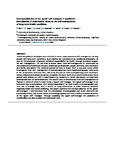Conceptualisation of the ‘good’ self-manager: A qualitative investigation of stakeholder views on the self-management of long-term health conditions

Date
2017-03Author
Subject
Metadata
Show full item recordAbstract
Healthcare policy in developed countries has, in recent years, promoted self-management among people with long-term conditions. Such policies are underpinned by neoliberal philosophy, as seen in the promotion of greater individual responsibility for health through increased support for self-management. Yet still little is known about how self-management is understood by commissioners of healthcare services, healthcare professionals, people with long-term conditions and family care-givers. The evidence presented here is drawn from a two-year study, which investigated how self-management is conceptualised by these stakeholder groups. Conducted in the UK between 2013 and 2015, this study focused on three exemplar long-term conditions, stroke, diabetes and colorectal cancer, to explore the issue. Semi-structured interviews and focus groups were carried out with 174 participants (97 patients, 35 family care-givers, 20 healthcare professionals and 22 commissioners). The data is used to demonstrate how self-management is framed in terms of what it means to be a 'good' self-manager. The 'good' self-manager is an individual who is remoralised; thus taking responsibility for their health; is knowledgeable and uses this to manage risks; and, is 'active' in using information to make informed decisions regarding health and social wellbeing. This paper examines the conceptualisation of the 'good' self-manager. It demonstrates how the remoralised, knowledgeable and active elements are inextricably linked, that is, how action is knowledge applied and how morality underlies all action of the 'good' self-manager. Through unpicking the 'good' self-manager the problems of neoliberalism are also revealed and addressed here.
Description
Collections
Publisher
Place of Publication
Journal
Volume
Pagination
Author URL
Number
Recommended, similar items
The following license files are associated with this item:
Related items
Showing items related by title, author, creator and subject.
-
Port Sustainability Management System for Smaller Ports in Cornwall and Devon
Kuznetsov, Andrei (Plymouth University, 2014)Many smaller ports in Cornwall and Devon (CAD) are situated in environmentally sensitive habitats and generate benefits for stakeholders and local communities. Such ports are often embedded in tourist based economies. ... -
An Investigation of the Critical Factors that influence Project Management Success in Agile Projects
Linka, Katharina (Plymouth Business School, University of Plymouth, 2018)As projects are becoming more and more complex and the environment is changing more quickly, traditional methods in project management reach their limits. This is why many projects fail to succeed. While overall project ... -
EXPLORING THE MAIN DRIVERS OF GREEN SUPPLY CHAIN MANAGEMENT PRACTICES AND ITS IMPACT IN THE FIRMS’ GREEN IMAGE A study in Spanish automotive industrial firms
Leal Rodríguez, Julio (Plymouth Business School, University of Plymouth, 2017)Purpose: the main purpose of this dissertation is to empirically explore and discuss a research model comprising (i) three antecedents or drivers of firms’ green supply chain management practices (i.e., relationship ...


